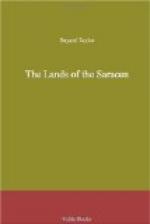After four hours of steady descent, during the last hour of which we passed into a forest entirely of oaks, we reached the first terrace at the base of the mountain. Here, as I was riding in advance of the caravan, I met a company of Turkish officers, who saluted me with an inclination of the most profound reverence. I replied with due Oriental gravity, which seemed to justify their respect, for when they met Francois, who is everywhere looked upon as a Turkish janissary, they asked: “Is not your master a Shekh el-Islam?” “You are right: he is,” answered the unscrupulous Greek. A Shekh el-Islam is a sort of high-priest, corresponding in dignity to a Cardinal in the Roman Catholic Church. It is rather singular that I am generally taken for a Secretary of some kind, or a Moslem priest, while my companion, who, by this time, has assumed the Oriental expression, is supposed to be either medical or military.
We had no sooner left the forests and entered the copsewood which followed, than the blue bulk, of Olympus suddenly appeared in the west, towering far into the sky. It is a magnificent mountain, with a broad though broken summit, streaked with snow. Before us, stretching away almost to his base, lay a grand mountain slope, covered with orchards and golden harvest-fields. Through lanes of hawthorn and chestnut trees in blossom, which were overgrown with snowy clematis and made a shady roof above our heads, we reached the little village of Orta Koei, and encamped in a grove of pear-trees. There was grass for our beasts, who were on the brink of starvation, and fowls and cucumbers for ourselves, who had been limited to bread and coffee for two days. But as one necessity was restored, another disappeared. We had smoked the last of our delicious Aleppo tobacco, and that which the villagers gave us was of very inferior quality. Nevertheless, the pipe which we smoked with them in the twilight, beside the marble fountain, promoted that peace of mind which is the sweetest preparative of slumber.




